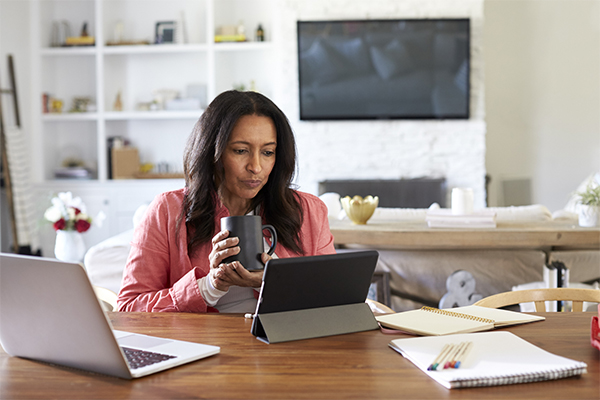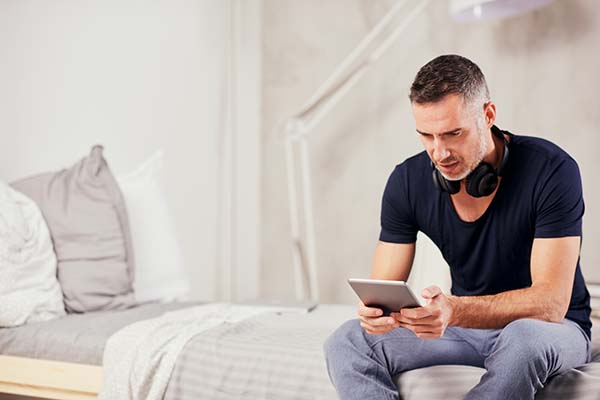The coronavirus pandemic is leaving many of us feeling anxious, even more uncertain about the future than usual and as if everything is out of our control.
While we can not control what other people do or the global spread of the virus, there are things we can do to take back some control in our lives.
It’s a really important time to practise self-care and to look after ourselves, so we can protect our own mental health and wellbeing.
The Government and NHS have advice on physical precautions people can take themselves to help reduce the spread of the virus – such as hand washing, avoiding touching the face and sneezing into elbows – as well as guidance on social distancing and self-isolation.
And our member Eve Menezes Cunningham has shared some useful tips about self-care amid the coronavirus outbreak to help look after your mind, body, heart and soul.
Mind
“We know that stress exacerbates many physical conditions. The mind-body connection is an amazing thing and the more we can do to support our health and wellbeing, the better,” says Eve.
Breathing
She recommends mindful breath practices, such as simply noticing your breath.
She says: “Is it shallow - from the top of the lungs? Coming from the middle of the lungs? A deeper belly breath? If it feels OK to do so, aim to lower the breath as if breathing from the belly as this is calming and will help you stay focused on it. Now get a sense of the length of each breath. Is the inhale longer? Exhale longer? Even?”
She added: “Some people like to count (in for one, out for two or three or a ratio that feels good for you) or simply get a sense of a slightly longer exhalation. Each time your mind wanders, congratulate yourself for noticing and bring the awareness back to the breath. Aim for five minutes but even one minute is helpful.”
Grounding tools
She also recommends grounding tools.
“These are ways in which we connect with the healing, nourishing earth energy that is supporting us with each breath and step we take. Pause to notice the parts of the body that are currently in contact with the ground. Sense each part. Feel that support. Imagine roots, as if you’re a tree, going deep into the heart of the earth from these parts of the body.
“Breathe in that grounding, nourishing, supportive energy. If it feels good, release some of your worries into these roots with the next exhale, giving them to the earth to recycle and heal for you. Breathe up nourishing, resourceful, empowering, supportive energy. Repeat as often as you can.”
Use all your senses
You can use all your senses to notice where you are. You might want to notice five things you can see right now, says Eve.
“What can you hear right now? Any smells or tastes? Another simple grounding tool is to inhale as you tense the thighs and exhale as you release them,” adds Eve.
“These can help us resist the well-worn neural pathways around catastrophising and feeling helpless.”
“They are a wonderful way to not only feel better very quickly but they’re ways to cultivate the mind,” says Eve who is the author of 365 Ways to Feel Better: Self-care Ideas for Embodied Wellbeing and a senior accredited supervisor, online and coach and runs Self Care Coaching.
Body
Eve recommends thinking about the nutrients you are getting in your meals and drinks.
Fruit and veg
“No toilet rolls in supermarkets is only an issue if you’ve run out at home,” she adds. “How would it feel to stock up on your favourite fruits and veg? To spend some time nourishing ‘Future You’ by batch cooking then freezing portions of smoothies and soups and other nutritious meals?”
Are you getting enough exercise?
Exercise
“This might be an opportunity to shake up your routine (if you’re concerned about hygiene in group exercise settings).
“Get out for a walk.
“Do more of your yoga (or whatever you love) at home.
“Get the worry out of your body.”
She adds: “Honour the natural fight/flight response to help your body help your mind (and immune function).”
Vigorous cleaning
“Have a stomp or do some vigorous cleaning – anything to get moving and connect with your strength and resilience.”
There are lots of online options for so many different types of exercise, including yoga poses and breath practices.
Heart
Check on loved ones, friends and neighbours – especially those who are more vulnerable, says Eve.
And she adds: “Self-soothing is so important. It helps downgrade the stress response and get ourselves back into a more resourceful state.”
She recommends EFT - Emotional Freedom Technique – which involves tapping acupressure points on and around your face, hand and upper body while repeating words and phrases that relate to the emotional or physical issue you want freedom around.
“EFT can be a wonderful way to give your fears a voice and move past them, releasing any energy blocks around them.”
Soul
“Remember that there’s so much more to you than your worries (or symptoms) around coronavirus.
How might this whole situation be trying to help you?
“This is a bit of an advanced practice when feeling anxious but journaling around what might be trying to emerge at a soul level can be helpful,” she adds.
Eve recommends the Thich Nhat Hanh meditation, which is all about welcoming all feelings.
She describes how to do it:
“Sit or lie down comfortably and bring your awareness to whatever feeling feels most prominent.
It might be a part of the body that feels hot (or cold), it might be a symptom, it might be an emotion, it might be a pleasant sensation or feeling… simply notice the most obvious feeling and say (in your head), ‘I feel…’
And then, for the more challenging part, ‘I welcome…’
We often find it challenging to welcome feelings we’d rather not be feeling, whether they’re physical sensations or symptoms or thoughts or emotions.”
Mindfulness
Eve adds: “Even increasing our mindfulness around which feelings we struggle to welcome more (it may mean welcoming them through gritted teeth) can raise our awareness about what’s coming up for healing in our own responses to coronavirus and anything else that worries you.”
Eve's shared more self-care tips on her own website.
To find a counsellor or psychotherapist who can help you visit our Therapist directory.

Coronavirus: How to look after your wellbeing while working from home
Our member Sally Brown has some useful tips to help smooth the transition to working from home

Coronavirus self-isolation: How to look after your mental health and wellbeing if you’re self-isolating
Our member Kathryn Kinmond has some helpful coping strategies if you’re self-isolating

Coronavirus anxiety: how to cope if you’re feeling anxious about the outbreak
Counsellors share their thoughts on what can help with the mental health impact of this global news story
